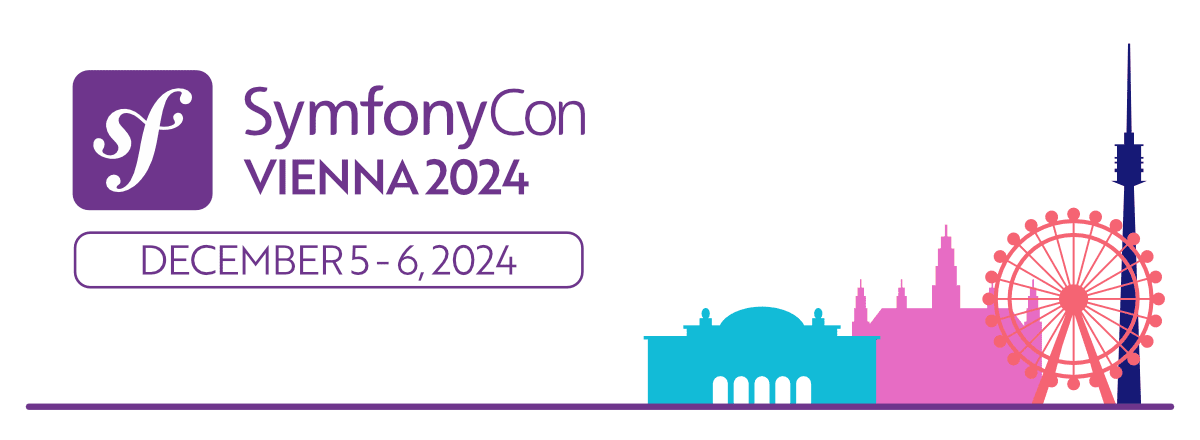SymfonyCon Vienna 2024: From Translations to Multi Dimension Entities
October 16, 2024
•
Published by
![]() Eloïse Charrier
Eloïse Charrier
 SymfonyCon Vienna 2024, our next annual international Symfony conference, will take place on:
SymfonyCon Vienna 2024, our next annual international Symfony conference, will take place on:
- December 3 & 4: Two days of hands-on workshops to learn, practice, and enhance your skills in small groups.
- December 5 & 6: Three English-speaking tracks with over 35 outstanding speakers, an Unconference track, and a lively community evening.
🚨Today (October 16th) is the very last day to get the SymfonyCon tickets at the regular price, seize the chance🚨
🎤 New speaker announcement!
We are super happy to announce our next speaker: Alexander Schranz (alex_s_), Web Developer, Sulu GmbH will present the topic "From Translations to Multi Dimension Entities":
"Content management is more than just adding a text editor to your project. Initially, you may only need a basic text editor for your Entity. However, as your project grows, you might require support for multiple languages, and when drafting or versioning come into play, things can get tricky.
In this talk, I will provide a quick introduction to different ways of data modeling and the libraries available to meet these needs. I'll also share a brief history of Sulu's content storage and explain why we decided to redesign the entire content storage system for a better future.
You'll learn how to evolve from a simple Doctrine entity to a translatable entity, and finally, to a multi-dimensional entity that supports multiple languages, drafting, versioning, and more. These concepts are reusable even if you're not using our beloved CMS."
🔎 Discover the exciting talks and workshops at SymfonyCon Vienna 2024!
Dive into the first exciting talks, featuring top-notch expert speakers as Fabien Potencier, Viktor Pikaev, Andreas Braun, Michelle Sanver, Sebastian Bergmann, Ondřej Mirtes, Alexander M. Turek, David Buchmann, Marie Minasyan, Nils Adermann, Anne-Julia Seitz, Thibault Milan, Romain Ruaud, Stephan Hochdörfer, Juliette Reinders Folmer, Dave Liddament, Rob Allen, Tugdual Saunier, Simon André, Mathias Arlaud, Adrien Roches, Hubert Lenoir, Antoine Bluchet, Alexander Schranz, Allison Guilhem, Kévin Dunglas, Nicolas Grekas, Sebastian Plagemann, Stephan Hochdörfer, Raphaël Geffroy, Peter Dietrich, Céline Deis, Johannes Wachter, Matheo Daninos, Robin Chalas, Paul Dragoonis, Antonis Kalipetis, Guillaume Moigneu, Florent Huck, Augustin Delaporte, Celeste Van Der Watt, Greg Qualls, Thomas di Luccio, Nigel Kersten, Moritz Schuh, Haylee Millar and, Kemi Elizabeth Ojogbede.
Explore the great lineup of talks here.
Check out the exciting workshop topics on this page.
🫵 Participate in the Unconference track
The Unconference track is a participant-driven format where attendees shape the content and discussions in real-time. Have a topic you're passionate about? Claim your slot by emailing us at events@symfony.com and set the stage for an unforgettable experience.
Each unconference talk lasts 20 minutes with a screen and projector available on both days.
🧳 Plan your participation
Use the schedule to organize your visit.
Read our attendee guide for venue, accommodation, and transportation details.
Complete your Symfony Live profile to inform us of your dietary preferences, T-shirt size and talk preferences!
🎉 Plan to attend the community evening on Thursday, December 5
Enjoy a friendly evening from 7:30 to 10:30 pm at a secret location (20 minutes by public transport from the conference). More details to come.
💻 Save the date for the Symfony hackathon on Saturday, December 7
Everyone is welcome to join the hackday! Whether you're an experienced contributor or new to the community, your participation is highly valued as it brings a fresh perspective! More details are available here. Address: Stockwerk, Pater-Schwartz-Gasse 11A, 1150 Wien - Map
💡 Follow the "conferences" blog posts to stay updated!
We can't wait to meet you in person to learn and share the latest about Symfony. Join us and be part of the @symfony community! 🫶
Help the Symfony project!
As with any Open-Source project, contributing code or documentation is the most common way to help, but we also have a wide range of sponsoring opportunities.